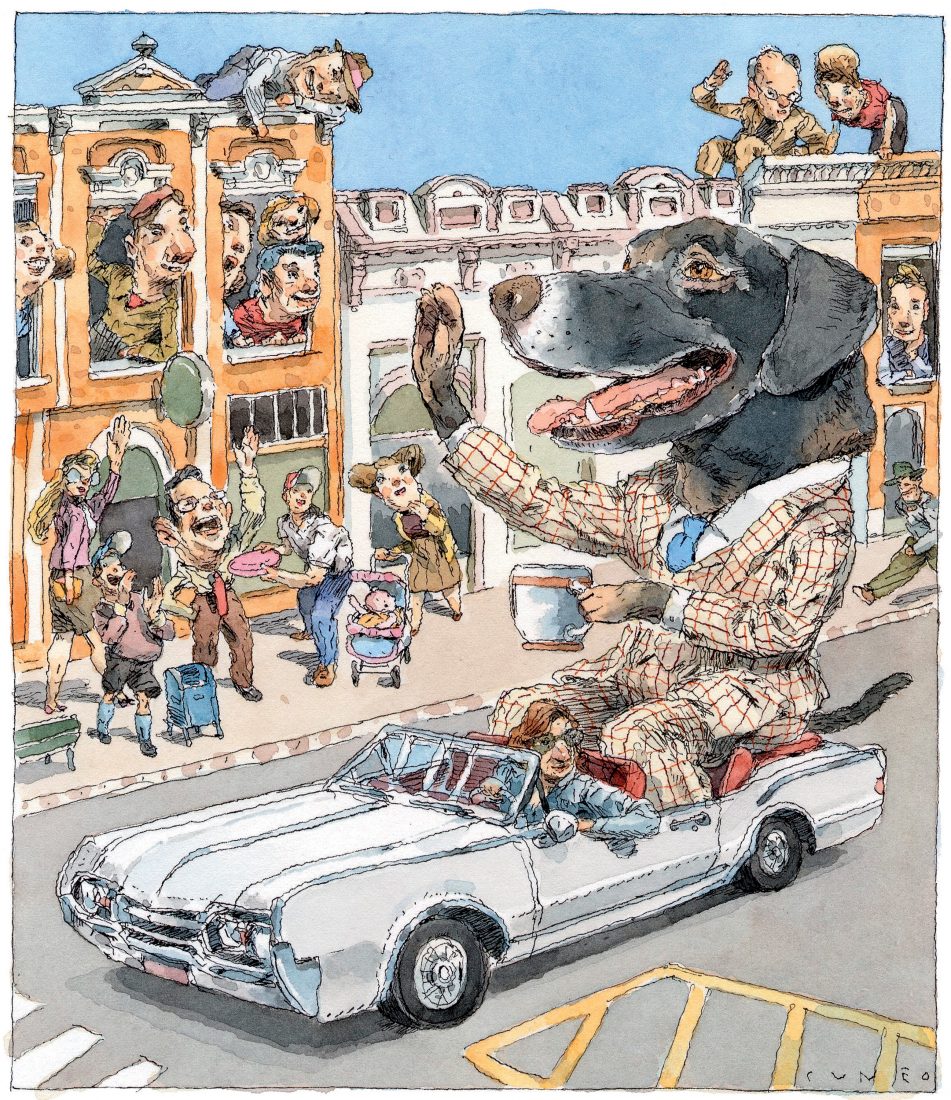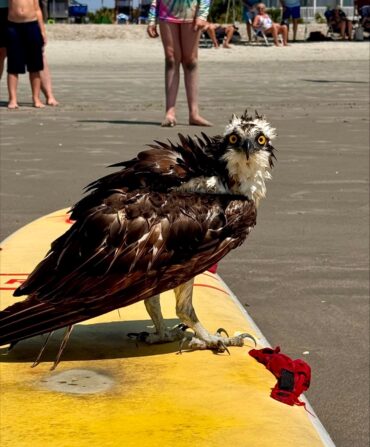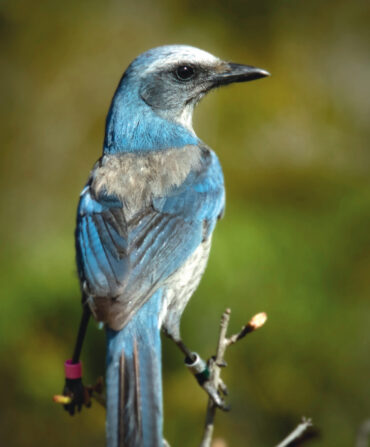My buddy Ronzo once gave away a litter of puppies only to discover some years later that one of them was being kept in an electrified pen. The new owner, a farmer friend, told him the dog had been “gettin’ after” his cows. Ronzo negotiated the return of the thoroughly freaked-out, now four-year-old black Lab, whom the friend had named King. He turned out to be a wounded soul with untrusting eyes and a prematurely white snout. Ron Shapiro—Ronzo to his friends—and I were roommates and business partners back in the mid-1980s. We lived in a hippie cabin seven miles in the woods outside of Oxford, Mississippi. Those years were our ’60s. Oxford was just beginning its evolution from hickville to litville.
We operated the Hoka, a bohemian coffeehouse/movie theater, named after the Chickasaw princess who had once owned the land that would become Oxford. The converted cotton warehouse catered to Ole Miss kids and a variety of oddballs with a menu of art films, wheat bread sandwiches, and killer desserts. Dogs just happened to be allowed (we bought off the health inspector with cheesecake).
King, as might be imagined, was skittish at first. For months he wouldn’t come out of the Hoka’s back office. Little by little he emerged, the aromas from the kitchen easing the way. Finally he found a favorite chair. He even started watching movies in the theater.
This “dogs welcome” policy certainly found favor with the locals, including the late great writer Willie Morris. Willie had recently rebounded to his home state after a divorce and a heroic but controversial tenure as the youngest editor of Harper’s magazine. He spent the 1980s in Oxford, and he and his black Lab, Pete, were Hoka regulars. Pete would coil up at Willie’s feet as the author downed bourbon-laced coffee at the counter, usually closing the place at 2:00 a.m. and moving the party to his nearby faculty bungalow. Pete shows up in many of Willie’s pieces and on the cover of his brilliant collection Terrains of the Heart and Other Essays on Home. The cover photo shows Willie ambling across the field of the Ole Miss football stadium, empty on a quiet weekday—alone, windswept, forlorn. Behind him a few paces, if you squint, there is Pete, shadowing Willie like a happy ghost. When Pete died, Oxford grieved, and he was actually interred in one of the town’s human cemeteries, named, of course, St. Peter’s.
The loss of Pete left Willie bereft, to use one of his favorite words. He began asking Ronzo if King could visit, and these cheer-up soirees invariably turned into sleepovers. Eventually we wouldn’t see King for two or three days at a time.
King had blossomed into something of a local celebrity himself. He and Ronzo were man and dog about town, showing up at most any event or just presiding at the Hoka. Most memorably, they could be seen tooling around the square in Ronzo’s massive white Oldsmobile convertible. The vehicle was a distinctive land yacht among the college-town Beamers and Jeeps. It lumbered along like a parade float with the top down and Ronzo at the wheel, his shoulder-length hair waving at passersby. King sat in the backseat, well, regally, chauffeured by a human.
One day Ronzo and I were tossing a Frisbee before a long Hoka shift, and Ronzo sailed one way over my head and it kept sailing. King, without prodding, charged after it. Leaving the ground at the precise moment and fully extending himself, he snared the disk in his teeth before flying to a stop and casually returning it to Ronzo. We rejoiced in this. And once Willie witnessed King’s feats, he persuaded a fellow dog lover, then Ole Miss head football coach Billy “Dog” Brewer, to have King perform at halftime of the Vanderbilt game. King missed the first couple of throws that day, from an unfamiliar cheerleader. But he soon found his rhythm, and by the end, the entire stadium was roaring. Ronzo and I were standing down on the field, on the sidelines, and had the rare thrill of feeling forty thousand voices in full throat cascading from above. We later joked it was the most offense the crowd would see all day.
King even rescued me late one night during a war games party thrown by our good friends Ron and Becky Feder. At a certain point, late in the evening, Ron put on side three of the Apocalypse Now sound track (the original vinyl), which consisted mostly of manic machine gun fire and chopping helicopter blades. He cranked it. Whoever didn’t leave, he divided into teams. He equipped each team with Roman candles and flares, and we hiked two short blocks down to Rowan Oak, William Faulkner’s house. Surrounding the house was (and still is) a pleasant forested area, Bailey’s Woods, with a walking trail and a wooden footbridge spanning a dry creek bed. During the fog of war, I stumbled around a deep thicket and sustained a gash on my left leg. It stung as only being stupid can. Thick sheets of the gunpowder smoke enveloped the woods, and I suddenly had no idea how to get back to my team. I could make out a weird shadow shifting near the ground ahead of me, so I moved toward it. The shadow turned out to be King, who calmly led me back to the main path. I could see him only because he contrasted with the darkness. He was blacker than the night, and I’ll always be grateful for his grace under craziness.
Willie’s dog grief became exacerbated as the long Pete-less nights wore on, amplified by bourbon and Viceroy filter tips. During one liquid late night, with Ronzo and me out of town, Willie paid his tab and told the Hoka kitchen staff he was taking King for the night. Willie and a small group, including an overbearing New York transplant, Terry B., piled into Willie’s Buick, with King riding shotgun. At Willie’s house, after several more rounds of Jack Daniel’s, Willie and Terry B. decided it was time for convenience store chicken legs. Terry B. grabbed Willie’s keys and said he’d be right back. Unbeknownst to anyone, King slipped out and dashed after the car, galloping down the middle of the street. He was clipped by an oncoming vehicle that never stopped. Terry B. said later, “I heard a sound that was wrong.” He pulled over to check, and King was dead in the road. In this pre-cell-phone era, Terry B. was left to hysterically scoop up King by himself and figure out how to break the news to Willie, and then of course, ultimately, to Ronzo. Causing the death of your friend’s dog, even accidentally, is an adult dose of anguish, an electric pen around your brain.
We buried King in the backyard of our cabin. Willie came out and spoke a few tortured words. Dog man that he was, he never got over it. Terry B.’s heart-searing guilt was so severe, he left town. Ronzo and I went through all the stages of grief, most especially anger. But anger isn’t how we remember the dogs of our lives. The anger is no match for the bright memories—in our case, of a flying dog, rescued from fear and bringing thunderous cheers from an admiring throng. And then going for a spin with the top down.
Jim Dees is the host of the Oxford-based Thacker Mountain Radio, a music and literature program on Mississippi Public Broadcasting.








